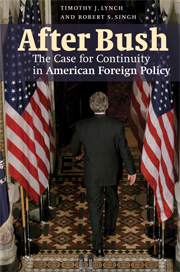Book contents
- Frontmatter
- Contents
- List of figures
- Acknowledgements
- Introduction: Winning the Second Cold War
- Chapter 1 Bush and the American foreign policy tradition
- Chapter 2 The constitution of American national security
- Chapter 3 The Second Cold War on Islamist terror: negative audits
- Chapter 4 The Second Cold War on Islamist terror: a positive audit
- Chapter 5 Iraq: Vietnam in the sand?
- Chapter 6 The Middle East: reformation or Armageddon
- Chapter 7 Frineds and foes after Bush
- Chapter 8 The emerging consensus at home and aborad
- Conclusion: The case for contiuity
- Notes
- Bibliography
- Index
Chapter 7 - Frineds and foes after Bush
Published online by Cambridge University Press: 22 September 2009
- Frontmatter
- Contents
- List of figures
- Acknowledgements
- Introduction: Winning the Second Cold War
- Chapter 1 Bush and the American foreign policy tradition
- Chapter 2 The constitution of American national security
- Chapter 3 The Second Cold War on Islamist terror: negative audits
- Chapter 4 The Second Cold War on Islamist terror: a positive audit
- Chapter 5 Iraq: Vietnam in the sand?
- Chapter 6 The Middle East: reformation or Armageddon
- Chapter 7 Frineds and foes after Bush
- Chapter 8 The emerging consensus at home and aborad
- Conclusion: The case for contiuity
- Notes
- Bibliography
- Index
Summary
The nation which indulges towards another a habitual hatred or a habitual fondness is in some degree a slave. It is a slave to its animosity or to its affection, either of which is sufficient to lead it astray from its duty and its interest.
George WashingtonWe act in alliance or partnership when other states share our interests, but will act unilaterally when compelling national interests demand.
Bill ClintonJudge me by the enemies I have made.
Franklin D. RooseveltJust as we do not today differentiate between the Roman Republic and the imperial period of the Julio-Claudians when we think of the Roman Empire, so in the future no-one will bother to make a distinction between the British Empire-led and the American Republic-led periods of English-speaking dominance between the late-eighteenth and the twenty-first centuries.
Andrew RobertsIn this chapter we extend our case for continuity by assessing the condition and likely future course of America's foreign relationships with key friends and foes, states, and international organizations. We argue that President Bush altered the substance of several relationships and that his successors' diplomacy and statecraft will continue to reflect this. Rather than being responsible for an enforced American solitude, Bush shifted his alliance-making and use of international institutions to reflect the demands of the war on terror. He also adapted to the many continuities of international relations. Ensuing US administrations will depart very little from this approach.
- Type
- Chapter
- Information
- After BushThe Case for Continuity in American Foreign Policy, pp. 227 - 255Publisher: Cambridge University PressPrint publication year: 2008



